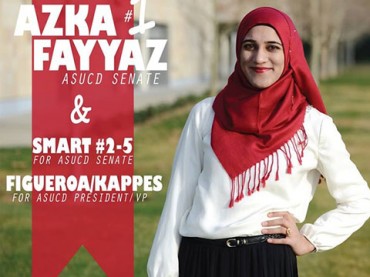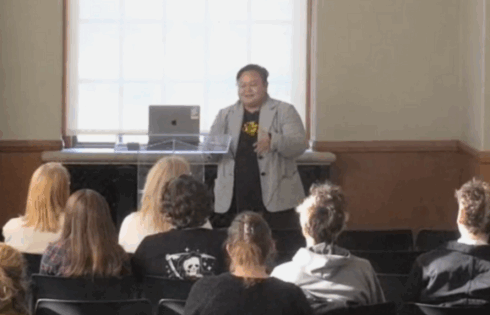
Claims her Sharia caption was just ‘satirical’
A Muslim student senator at the University of California-Davis has been blamed for inciting vandalism against Jewish organizations, following her Facebook posts in celebration of an approved divestment resolution.
Local police declined to tell The College Fix whether they are investigating any possible role by Azka Fayyaz in the vandalism against the Alpha Epsilon Pi (AEPi) house late last month.
But almost two dozen Jewish organizations called on UC-Davis to investigate Fayyaz and the campus chapter of Students for Justice in Palestine (SJP) for allegedly violating university policies and fostering “divisiveness, hatred and bigotry on campus.”
The student senate Jan. 29 approved a resolution asking the UC board of regents to divest from “corporations that aid in the Israeli occupation of Palestine and illegal settlements in Palestinian territories.” It was the senate’s third attempt in two years, The California Aggie reported.
Following the 8-2-2 passage of the resolution, Aggies for Israel President Julia Reifkind led a call to action.
“You have divided our campus and damaged lives,” she told senators, according to a statement accompanying a video of her partial remarks to the senate meeting.
“So if you are here tonight in opposition to this resolution,” Reifkind says in the video, “I invite you now to stand up. Stand up and join me in walking out of this room.” Four rows of attendees, about a quarter of the room, got up and walked out, carrying Israeli and American flags.
‘Grout out the Jews’
 Fayyaz spoke out in equally harsh terms at the meeting, according to an Aggie editorial.
Fayyaz spoke out in equally harsh terms at the meeting, according to an Aggie editorial.
“You can’t have coexistence with Zionists,” Fayyaz said after the resolution vote. “Their purpose of Zionism is discrimination, elimination and ethnic cleansing of a group of people.
“So if you want to talk about coexistence, I’m not talking with you because you’re going to try to kill me. I’m Muslim,” she said.
In a post later that night, Fayyaz wrote: “Hamas and Sharia law have taken over UC Davis. Brb crying over the resilience.”
Following “public backlash” for that post, The Aggie said, Fayyaz wrote a second post the same night: “Israel will fall insha’Allah [God willing] #UCDDivest.” She put a smiling emoji before the hashtag.
AEPi members found “despicable and hateful graffiti” on the walls of their house Saturday morning, less than two days after the vote, “including a large red swastika that appeared to be spray-painted on the exterior of the house,” according to a statement from Chancellor Linda Katehi, Provost Ralph Hexter and Vice Chancellor for Student Affairs Adela de la Torre.
Swastikas painted on Jewish frat near UC Davis http://t.co/fk3bzHYU4O pic.twitter.com/PcK0jWQoZU
— NBC Bay Area (@nbcbayarea) February 2, 2015
The week before the AEPi vandalism, a janitor at the Hillel House found “grout out the Jews” written in a toilet stall, the Davis Enterprise reported.
The national head of AEPi implied that the UC-Davis chapter’s house was targeted because its members helped lead “the student movement to defend Israel” against the senate divestment resolution.
The divestment vote was later overturned by the UC-Davis student court because it didn’t “primarily” concern “student welfare,” as The Fix reported.
‘It can hardly be surprising’ vandalism followed Facebook post
Nearly two dozen Jewish organizations, including AEPi and the AMCHA Initiative, which says it fights anti-Semitism in higher education, asked Katehi in a Feb. 10 letter to investigate the campus chapter of SJP and its member Fayyaz specifically.
The letter noted that the pro-Israel protesters who walked out of the senate meeting at Reifkind’s direction were “heckled” with chants of “Allahu Akbar,” a phrase often associated with Islamic terrorism.
The letter said “it can hardly be surprising” that the AEPi house was vandalized “less than two days after the divestment vote and Fayyaz’s Facebook postings,” which weren’t her first “openly hateful acts.”
The groups predicted an investigation of Fayyaz and SJP would show their conduct “threatens the health and safety of Jewish and pro-Israel students,” that they “harassed other students” and “disturbed the peace” at the senate meeting, and “expressed an intent to terrorize other students” who are Jewish.
If Fayyaz and SJP are found guilty of wrongdoing, Fayyaz should be removed from her senate position and SJP should have its registration revoked, the letter told Katehi. It wants UC-Davis to “issue a strong public condemnation” of SJP and its members’ conduct.
AMCHA Director Tammi Rossman-Benjamin told The Fix in an email that she’s not aware of the local police identifying any “perpetrators” of the AEPi and Hillel House vandalisms.
UCLA law professor Eugene Volokh, an expert on First Amendment law, told The Fix by email he doesn’t see “any basis for faulting [Fayyaz] for ‘provoking’ the vandalism” through her posts, “any more than I would fault critics of Islam for ‘provoking’ the occasional vandalism that we see of Muslim institutions.”
Volokh said critics of Fayyaz should get her in “political trouble” if they want to punish her statements.
Belated apology after defensive letter
Fayyaz wrote a “letter to the community” published Feb. 2 that explained her intentions in the “Hamas and Sharia” post.
“Although I made a comment on the picture [in the original post] stating that the caption was satirical, the anti-divestment community conveniently left out the comment from the rest of the picture and took the caption out of context,” Fayyaz in the statement published in The Aggie.
“I have a choice to release this statement — just like those of you who are connecting me to anti-Semitic sentiments and maliciously attacking me are making a choice,” the statement continues.
Fayyaz appears to have requested an addition to her community letter after it was published. An afternoon “EDIT” features Fayyaz offering “my heartfelt apology” to those who “feel that I have put you through a difficult time,” in her first term as a senator.
Members of the student senate must agree to its “Principles of Community,” as the Aggie editorial notes. That means they must “strive to make decisions in an open and inclusive manner that respects, nurtures and reflects understanding of the needs and interests of all community members.”
Though many senators have used Facebook in an official capacity, the editorial said it was “inappropriate and insensitive to make a post on a public area that marginalizes and offends certain groups.”
College Fix reporter Samantha Watkins is a student at Point Loma Nazarene University.
Like The College Fix on Facebook / Follow us on Twitter
IMAGE: LocalWiki.org





Please join the conversation about our stories on Facebook, Twitter, Instagram, Reddit, MeWe, Rumble, Gab, Minds and Gettr.